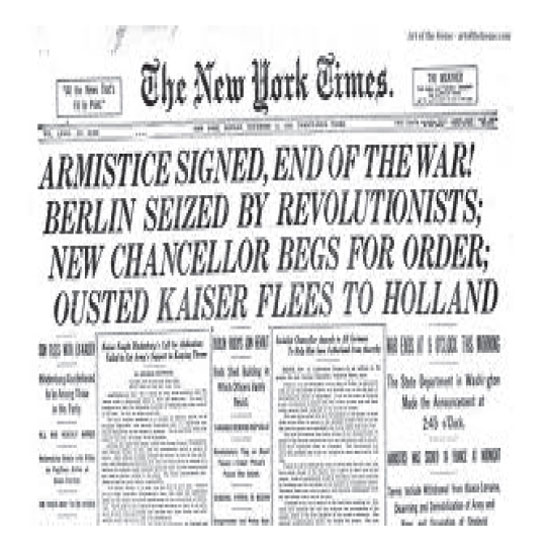

11th November 1918


The final Allied push towards the German border began on 17th October 1918. As the British, French and American armies advanced, the alliance between the Central Powers began to collapse. Turkey signed an armistice at the end of October, Austria-Hungary followed on 3rd November.
Germany began to crumble from within. Faced with the prospect of returning to sea, the sailors of the High Seas Fleet stationed at Kiel mutinied on 29th October. Within a few days, the entire city was in their control and the revolution spread throughout the country. On 9th November the Kaiser abdicated, slipping across the border into the Netherlands, and exile. A German Republic was declared and an offer of peace was extended to the Allies. At 5 am on the morning of 11th November an armistice was signed in a train carriage parked in a French forest near the front lines.
The terms of the agreement called for the cessation of fighting along the entire Western Front, to begin at precisely 11 am that morning. After more than four years of bloody conflict, the Great War was at an end.
Colonel Thomas Gowenlock served as an intelligence officer in the American 1st Division. He was on the front line that November morning and wrote of his experience a few years later:
On the morning of November 11th, I sat in my dugout in Le Gros Faux, which was again our Division HQ, talking to our Chief of Staff, Colonel John Greely, and Lieutenant Colonel Paul Peabody, our G-1. A signal corps officer entered and handed us the following message:
Official Radio from Paris - 6:01 A.M., Nov. 11th, 1918. Marshal Foch to the Commander-in-Chief.
1. Hostilities will cease on the entire Front beginning at 11 o’clock, November 11th (French hour).
2. The Allied troops will not go beyond the line reached at that hour on that date until further orders.
MARSHAL FOCH
5:45 A.M.
‘Well, fini la guerre!’ said Colonel Greely.
‘Sure looks like it,’ I agreed.
‘Do you know what I want to do now?’ he said. ‘I’d like to get on one of those little horse-drawn canal boats in southern France and lie in the sun the rest of my life.’
My watch said nine o’clock. With only two hours to go, I drove over to the bank of the Meuse River to see the finish. The shelling was heavy and, as I walked down the road, it grew steadily worse. It seemed to me that every battery in the world was trying to burn up its guns. At last eleven o’clock came – but the firing continued. The men on both sides had decided to give each other all they had – their farewell to arms. It was a very natural impulse after their years of war, but unfortunately many fell after eleven o’clock that day.
All over the world on 11th November 1918, people were celebrating, dancing in the streets, drinking champagne, and hailing the Armistice that meant the end of the war. But at the front there was no celebration. Many soldiers believed the Armistice only a temporary measure and that the war would soon go on. As night came, the quietness, unearthly in its penetration, began to eat into their souls. The men sat around log fires, the first they had ever had at the Front. They were trying to reassure themselves that there were no enemy batteries spying on them from the next hill and no German bombing planes approaching to blast them out of existence. They talked in low tones. They were nervous. After the long months of intense strain, of keying themselves up to the daily mortal danger, of thinking always in terms of war and the enemy, the abrupt release from it all was physical and psychological agony. Some suffered a total nervous collapse. Some, of a steadier temperament, began to hope they would some day return to home and the embrace of loved ones. Some could think only of the crude little crosses that marked the graves of their comrades. Some fell into an exhausted sleep. All were bewildered by the sudden meaninglessness of their existence as soldiers – and through their teeming memories paraded that swiftly moving cavalcade of Cantigny, Soissons, St Mihiel, the Meuse-Argonne and Sedan.
What was to come next? They did not know – and hardly cared. Their minds were numbed by the shock of peace. The past consumed their whole consciousness. The present did not exist. And the future was inconceivable.